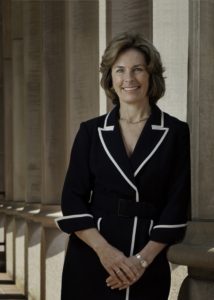Justice Rebecca Love Kourlis: Home On, And Off, The Range

Rebecca Love Kourlis, JD ’76 (BA ’73), is as comfortable in a well-tailored suit as she is in a cowboy hat. Since childhood, this Colorado native has moved easily between rural and urban environs, navigating a course that has culminated in her leadership of the University of Denver’s Institute for the Advancement of the American Legal System (IAALS), of which she is the founder and executive director.
Born and raised in Colorado Springs, Kourlis and her family relocated to Denver when she was 10 years old and her father, John Love (who later became the nation’s first “energy czar”), was elected governor. There she was exposed to lawyers, like her father, whom she held in high regard. “They impressed upon me that a legal education was a wonderful underpinning for any career and that law was at the foundation of how this country functioned and its ideals,” she says.
Kourlis majored in English literature at Stanford while pursuing her interest in law. But she was undecided about her future and elected to put her formal education on hold following graduation. Instead, she accepted a position as a White House intern. “It was before that term had been sullied,” she jokes.
That was the summer of 1973. By July, Watergate had erupted and, according to Kourlis, “the White House froze.”
“Even though I had a close-up view”—her cubicle was just down the hall from White House counsel John Dean’s office—“I realized I was unlikely to have a great mentoring experience in that environment,” she says.
Much to Kourlis’ delight, Stanford Law School, to which she had applied while an undergraduate, agreed to admit her with that fall’s entering class. “I’d had a big enough dose of the real world and I was thrilled to be back in school. And I loved Stanford.”
Following law school, she returned to Denver to work with a large regional law firm. And soon thereafter she reconnected with sheep and cattle rancher Tom Kourlis, whom she had gotten to know while spending vacations at a friend’s neighboring ranch when her father was governor.
The two were married in 1978, and Kourlis moved to Craig, Colorado, a small agricultural town where her husband ran the ranch and she became a solo practitioner. “I was one of only five lawyers in Craig and I had to learn everything,” she says. And while she enjoyed it, she missed the mentoring of more experienced practitioners.
So in 1981, when former dean of Stanford Law School Charlie Meyers called, Kourlis was ready to listen. “He was opening Gibson, Dunn & Crutcher’s Denver office and asked me to come work for him,” she recalls. And although it meant commuting by airplane several times a month, Kourlis eagerly agreed, even managing to bring infant Stacy, JD ’13, along with her.
Following the birth of second daughter Kate (BA ’07) in 1985, Kourlis returned to her practice in Craig until she applied for a trial judge position. Appointed by Governor Romer, she began “riding circuit” in rural Colorado in January 1987. “I drove over mountain passes throughout the district and heard everything from death penalty cases, to divorces, to complex civil litigation,” she says.
Kourlis welcomed the challenges and rewards of being a judge, but she resigned in 1994 when her husband was appointed as Colorado’s secretary of agriculture and the family moved to Denver. There she worked as an arbitrator and mediator until 1995. Then two significant events occurred: She was appointed as the second woman to sit on the seven- member Colorado Supreme Court—and the next year her son, Tom, was born.
Kourlis says of serving on the court, “I loved the deep thinking, research and writing, the mentoring of and intellectually challenging interactions with law clerks, and the collaborative decision making.”
But what she really loved was the opportunity to improve the justice system. “That’s when I realized,” she says, “that this is where I could add value.”
And so after 11 years on the bench, Kourlis resigned and founded IAALS, “a national, nonpartisan ‘think-do’ tank dedicated to the improvement of the American legal system.”
IAALS conducts empirical and legal research to develop innovative and practical solutions to a variety of problems. So far, the institute has launched three initiatives: Quality Judges, which recommends empirically based models for choosing, evaluating, and retaining judges; Rule One, which recommends court procedures that provide greater access, efficiency, and accountability; and Educating Tomorrow’s Lawyers (originated at Stanford Law School), which identifies innovative models of legal education that produce knowledgeable, ethical, and practice-ready professionals.
Later this summer, the institute will launch a fourth initiative, which will focus on the treatment of families in the courts.
Kourlis’ recently published book, Rebuilding Justice: Civil Courts in Jeopardy and Why You Should Care, co-authored with IAALS fellow and distinguished journalist Dirk Olin, seeks to spread the institute’s message to a broader audience and infuse it with the urgency she feels. (See excerpt, p. 58.)
“There are parts of the legal system that just don’t make sense, and I care about the system enough to work very hard at trying to change those parts.” SL
